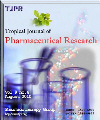
|
Tropical Journal of Pharmaceutical Research
Pharmacotherapy Group, Faculty of Pharmacy, University of Benin, Benin City, Nigeria
ISSN: 1596-5996
EISSN: 1596-5996
Vol. 13, No. 11, 2014, pp. 1917-1923
|
 Bioline Code: pr14264
Bioline Code: pr14264
Full paper language: English
Document type: Research Article
Document available free of charge
|
|
|
Tropical Journal of Pharmaceutical Research, Vol. 13, No. 11, 2014, pp. 1917-1923
| en |
Spectrophotometric Determination of Eflornithine Hydrochloride using Vanillin as Derivative Chromogenic Reagent
Kumar, Amit; Singh, Vijender & Kumar, Praveen
Abstract
Purpose: To develop and validate a spectrophotometric method for the quantitative determination of
eflornithine hydrochloride as a pure compound and in pharmaceutical formulations.
Methods: The method involved the reaction of the target compound with vanillin reagent at specific pH
5.6 to produce a green reddish color chromogen. The derivative chromogen exhibits absorption maxima
at 578 nm. At the pH of the reaction, there was no degradation. The developed method was validated
as per International Conference of Harmonization (ICH) guidelines with respect to specificity, linearity,
limit of detection, limit of quantification, accuracy, precision and robustness.
Results: Under the indicated conditions, the proposed method was linear over the concentration range
of 5 - 25 μg/ml and the correlation coefficient (r2) was > 0.998 (n = 6) with a relative standard deviation
(RSD) of 1.003 % (n = 6). Mean recovery of the target compound was 100.58 % with a limit of
quantification (LOQ) of 4.3 μg/ml and limit of detection (LOD) of 1.2 μg/ml.
Conclusion: The results demonstrate the stability-indicating power of the proposed method which is
precise, accurate, simple and economic. Thus, the method can be applied to the routine analysis of
eflornithine hydrochloride in bulk and pharmaceutical formulations.
Keywords
Eflornithine hydrochloride; Vanillin; Spectrophotometric assay; Validation; ICH guidelines
|
| |
© Copyright 2014 - Tropical Journal of Pharmaceutical Research
Alternative site location: http://www.tjpr.org
|
|
